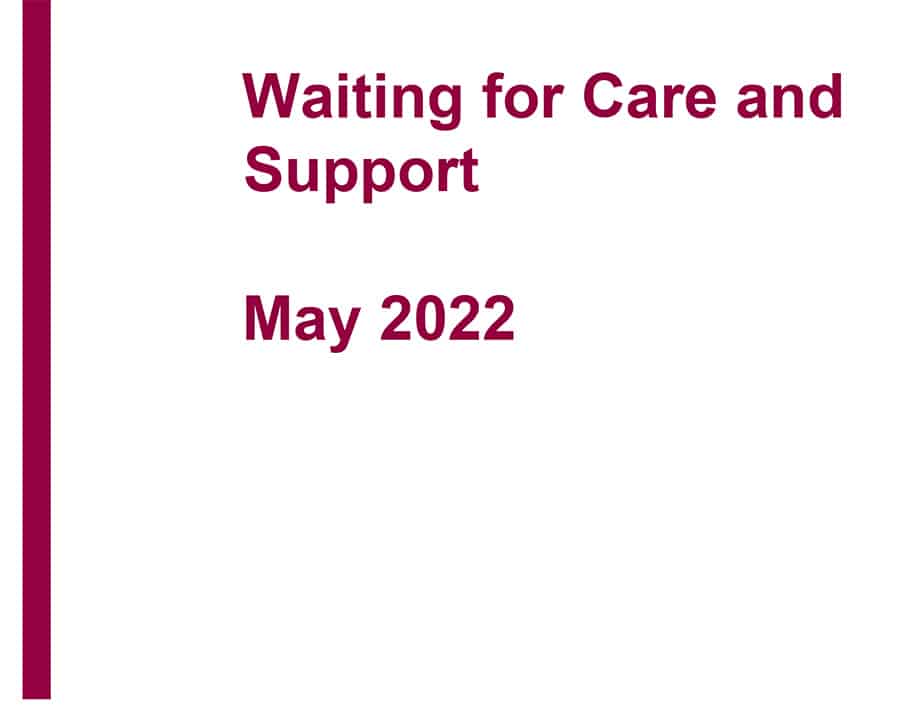ADASS report reveals more than half a million are waiting for social care

People could be missing out on being prescribed vital independent living equipment, like walking aids, toilet frames and riser recliners, as a new survey from ADASS (Association of Directors of Adult Social Services) reveals the increasingly unmanageable pressures on the social care sector.
ADASS’ new report unveils that more than half a million people are now waiting for an adult social care assessment, for care, or a direct payment to begin or for a review of their care.
Entitled ‘Waiting for Care and Support’, the report provides a snapshot of people waiting for social care in England.
The latest data suggests that more than six in 10 councils that responded say they are having to prioritise assessments and are only able to respond to people where abuse or neglect is highlighted, for hospital discharge, or after a temporary period of residential care to support recovery and reablement.
A total of 506,131 people were waiting for assessments, reviews, and/or care support to begin, which could include the provision of assistive technologies by councils to facilitate greater independence in around residents’ homes.
In addition, the report highlighted that there has been a 16 percent increase in the number of hours of home care that have been delivered since Spring 2021, but that dipped from a high of over 41 million hours in Autumn 2021 in the first quarter of this year as staff vacancies and sickness impacted.
Moreover, almost 170,000 hours a week of home care could not be delivered because of a shortage of care workers during the first three months of 2022. That is a dramatic seven-fold increase since Spring 2021.
The increasing and often unmanageable pressure on the social care sector is not a new issue. Earlier this year, ADASS called on the UK Government to provide at least £7 billion extra a year for the social care sector to meet rising demands as more people require care, particularly as a result of the coronavirus pandemic.
Responding to the findings, Sarah McClinton, ADASS President, said: “We have not seen the bounce back in services after the pandemic in the way we had hoped. In fact, the situation is getting worse rather than better.
“Social care is far from fixed.
“The Health and Social Care reforms go some way to tackle the issue of how much people contribute to the cost of their care, but it falls short in addressing social care’s most pressing issues: how we respond to rapidly increasing unmet need for essential care and support and resolve the workforce crisis by properly valuing care professionals.”
This new evidence shows that despite staff working relentlessly over the last two years, levels of unmet, undermet or wrongly met needs are increasing, and the situation is getting worse. The growing numbers of people needing care and the increasing complexity of their needs are far outstripping the capacity to meet them, ADASS warns.
Despite great achievements in increasing the amount of care provided, there is an even starker rise in the support now needed, with more people left without essential care to maintain their health, and dignity and lead good lives in their communities.
Not only are people waiting longer for care assessments, reviews, care packages and personal budgets, but family carers are having to shoulder greater responsibility and are being asked to take paid or unpaid leave from work when care and support are not available for their family members.
Making the focus of resources on acute hospitals, without addressing care and support at home, means people deteriorate and even more will need hospital care, the association underlines.
Cathie Williams, ADASS Chief Executive, commented: “Without action to prioritise care and support in people’s homes and local communities, it will take years rather than months to fully recover.
“We need a funded plan so that we can ensure that everyone gets the care and support they need, with more of the Health and Social Care Levy being used to fund care and support in people’s homes and communities over the next two years. People cannot wait for funding to trickle into adult social care and wider community services.”
Read the full report here.

